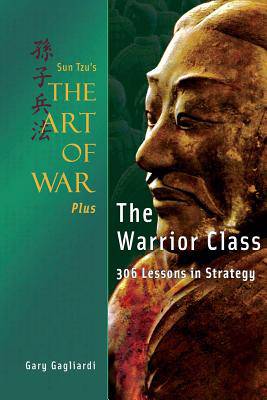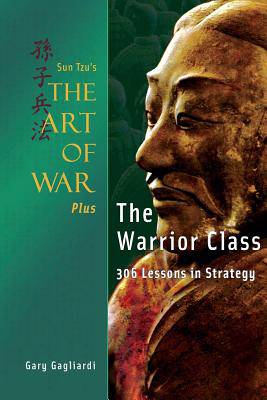
- Afhalen na 1 uur in een winkel met voorraad
- Gratis thuislevering in België vanaf € 30
- Ruim aanbod met 7 miljoen producten
- Afhalen na 1 uur in een winkel met voorraad
- Gratis thuislevering in België vanaf € 30
- Ruim aanbod met 7 miljoen producten
Zoeken
Sun Tzu's The Art of War Plus The Warrior Class
: 306 Lessons in Strategy
Sun Tzi, Gary Gagliardi
Paperback | Engels
€ 60,95
+ 121 punten
Omschrijving
The book that is the basis of the Science of Strategy Institute's on-line training program. This award-winning book (Foreword Magazine's Self-Help Book of the Year) offers our most detailed lessons of Sun Tzu's strategic methods. The book was designed as long series of short, easy-to-understand lessons for those who really want to understand the inner workings of human competition. Examples from modern business and every day life are used to illustrate what people do right and wrong in making strategic decisions.Each lesson is put into a format that frames each stanza of Sun Tzu's work as a specific strategic concept. Sun Tzu's non-intuitive approach to success is contrasted with our less successful instinctual reactions to competitive challenges. Below, we show you the table of contents, a list of the type of topics the lessons address, and a sample lesson from the book. Table of Contents Lesson Topics10 Using This Book15 Introduction: Sun Tzu's Basic Concepts Lessons 1-2116 Analysis Lessons 22-3839 Going to War Lessons 39-5358 Planning an Attack Lessons 54-6874 Positioning Lessons 69-8590 Momentum Lessons 86-104108 Weakness and Strength Lessons 105-124128 Armed Conflict Lessons 125-145150 Adaptability Lessons 146-159172 Armed March Lessons 160-193188 Field Position Lessons 194-220224 Types of Terrain Lessons 221-267252 Attacking with Fire Lessons 268-284300 Using Spies Lessons 285-306318 Glossary of Key Concepts342 Index of Art of War Topics348 Sample List of Lesson Topics Emotion versus Strategy17 2: The Framework of Strategy18 3: The Goal of Strategy19 4: A Unique Position20 5: The Competitive Environment21 6: The Changing Times22 7: Competitive Success23 8: The Need for a Philosophy24 9: Advancing a Position25 10: The Source of Knowledge26 11: The Source of Opportunity27 12: Acting on Vision28 13: Positioning29 14: Attacks and Battles30 15: Moving through Opposition31 Sample Lesson Lesson 14: Attacks and Battles What is the difference between an attack, a battle, and conflict? A.Only conflict is inherently destructive. B.Only battle is inherently costly. C.Only attack is inherently aggressive. D.There is no difference. You must avoid disasters from armed conflict. The Art of War 7:1.5 Answer: A. Only conflict is inherently destructive. In English, conflict, battle, and attack can be used interchangeably. However, Sun Tzu expresses these ideas as three distinct, though related, concepts critical to his strategic theory. The concept of attack is gong. It means movement ( hang) into a new area. It doesn't necessarily-but can-mean meeting the enemy in battle or conflict with an opposing force. Attacks are the topic of chapter 3, Planning an Attack. The concept of battle is zhan, which means meeting challenges or opponents but not necessarily conflict with them. We meet opponents when we have an advantage-when our opponents will back down, surrender, or come to an advantageous agreement. The final concept is zheng, conflict. This is the destructive meeting of forces. Typically, we avoid conflict, but it is not always avoidable. This is the topic of chapter 7, Armed Conflict. So we have an array of ideas becoming progressively more costly. Movement (hang) is the most general. Movement into new areas is attack (gong). Attacks that involve confrontation are battles (zhan). Battles that involve conflict are zheng .
Specificaties
Betrokkenen
- Auteur(s):
- Uitgeverij:
Inhoud
- Aantal bladzijden:
- 352
- Taal:
- Engels
Eigenschappen
- Productcode (EAN):
- 9781929194759
- Verschijningsdatum:
- 21/04/2014
- Uitvoering:
- Paperback
- Formaat:
- Trade paperback (VS)
- Afmetingen:
- 152 mm x 229 mm
- Gewicht:
- 471 g

Alleen bij Standaard Boekhandel
+ 121 punten op je klantenkaart van Standaard Boekhandel
Beoordelingen
We publiceren alleen reviews die voldoen aan de voorwaarden voor reviews. Bekijk onze voorwaarden voor reviews.











